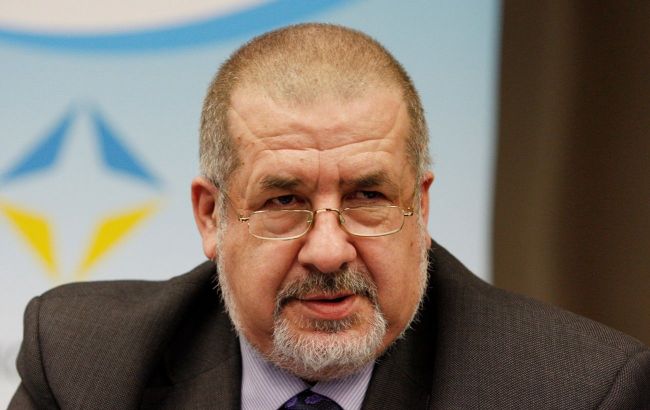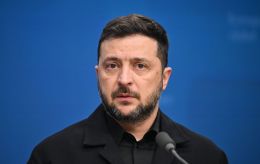'Russia as empire must collapse, otherwise war will happen again' - Mejlis head of Crimean Tatar People
 Refat Chubarov, the head of the Mejlis of the Crimean Tatar People (Photo: Getty Images)
Refat Chubarov, the head of the Mejlis of the Crimean Tatar People (Photo: Getty Images)
Refat Chubarov, the head of the Mejlis of the Crimean Tatar People, in an interview with RBC-Ukraine, shares his thoughts about what will happen in Crimea after liberation from occupiers.
In late February 2014, Russians invaded Crimea, initiating the annexation of the peninsula. This marked the beginning of the occupation of Ukrainian territories, which continues to this day, with the peninsula being the first target of Russian aggression. Ukrainians these days recall the resistance to the occupation of the Autonomous Republic of Crimea and Sevastopol.
Refat Chubarov, the Chairman of the Mejlis of the Crimean Tatar People, spoke to RBC-Ukraine about the current situation of oppression of Crimean Tatars on the peninsula and what will happen in Crimea when the Armed Forces of Ukraine liberate it.
Suppression of Crimean Tatars in the occupied peninsula
Before the Russian invasion at the beginning of 2014, there were around 300,000 Crimean Tatars living in Crimea, constituting about 13% of the total population of the peninsula, according to Refat Chubarov. Many Crimean Tatars left due to oppression and persecution, especially during the mobilization into the Russian army in 2022. Chubarov estimates that up to 50,000 people were forced to leave Crimea.
"The oppression of Crimean Tatars under occupation has intensified. Since the beginning of the occupation of Crimea, data on 307 political prisoners and persecuted individuals in various 'criminal cases' have been documented. Most of them are Crimean Tatars. Over the past six years, 71% of all human rights violations in Crimea were directed against Crimean Tatars. This indicates that Crimean Tatars have become direct targets of discrimination," he added.
For example, in the fall of 2021, several Crimean Tatars, including the First Deputy Chairman of the Mejlis, Nariman Dzhelalov, were arrested in Yevpatoria and Simferopol. Occupiers sentenced him to 17 years in a strict regime colony for allegedly organizing sabotage. But Refat Chubarov is convinced that Nariman was punished for participating in the Crimea Platform event in 2021.
"A delegation from the Mejlis attended this event; Nariman Dzhelalov spoke there and participated in various events with President Volodymyr Zelenskyy. The Russians warned him and threatened him not to go. But he did what he did. And in this way, they took revenge on him," he added.
Why Russia treats Crimean Tatars so aggressively
This is a longstanding policy of Moscow towards Crimea and Crimean Tatars: they have been doing this to us for centuries, Chubarov reminds. When the Soviet authorities first arrived in Crimea in 1919, indigenous peoples were given certain preferences because the new authorities needed to consolidate themselves, and the locals did not want to live under the communists. But this period did not last long.
"Russians began to settle in Crimea, and 'to make them feel comfortable there,' they began to change the local toponymy. They renamed settlements and streets, depriving Crimea of evidence of the historical heritage of Crimean Tatars. In 1944, the Stalinist regime carried out the deportation of Crimean Tatars. Several generations of those who left awaited their return home. They began to return in the late 1980s and early 1990s, but 2014 the occupation began," Chubarov explained.
What the liberation of Crimea from occupiers means for the world
If this war ends with Russia retaining control over Crimea or other occupied territories of Ukraine, it will indicate that the rules of the game have fundamentally changed.
"This would mean that in the world, everything can be resolved by force instead of resolving issues by law. Therefore, the liberation of Crimea 'is not only our Ukrainian issue. This is a question for the entire civilized world community,' believes the Chairman of the Mejlis of the Crimean Tatar people.
He believes that Russia will collapse and will not remain in its current borders.
"Russia as an empire must collapse. Otherwise, everything, including war, will happen again. We in the Mejlis actively cooperate with representatives of the subjugated peoples of the Russian Federation: Chechens, Ingush, and Tatars. They also want freedom. And representatives of these peoples are now fighting in Ukraine, defending our land," the interlocutor is convinced.
What will happen in Crimea after its liberation: Forecast
According to Chubarov, ten years of occupation is a long term, and during this time, occupiers have massively influenced people's thinking, including children. The Chairman of the Mejlis sees this as the worst thing that has happened in Crimea during the occupation.
"The worst destruction caused by Russia during this time is the destruction of the worldview and values in the minds of children growing up in occupied Crimea. Russian occupiers have established a regime of massive round-the-clock propaganda that manipulates people. Obviously, this cannot but affect the upbringing of a new generation," he emphasized.
In Crimea, after liberation, there must be a transitional period. Perhaps for about five years. This period is needed to establish a peaceful life. During such a period, civil-military administrations will work, and temporary elections will not be held. I think five years will be enough to address the main consequences of the occupation. This will ultimately allow the peninsula's residents to return to normal life.

